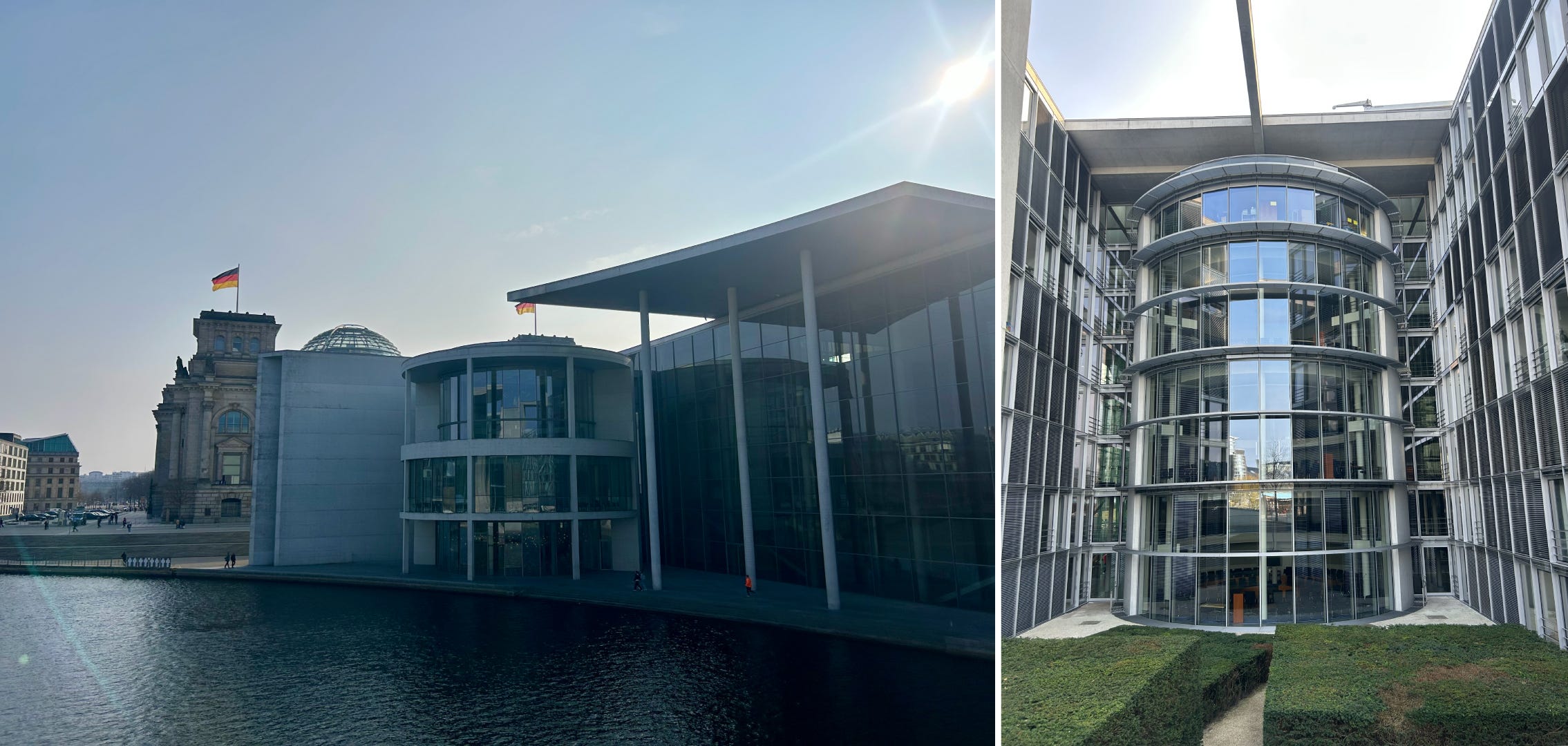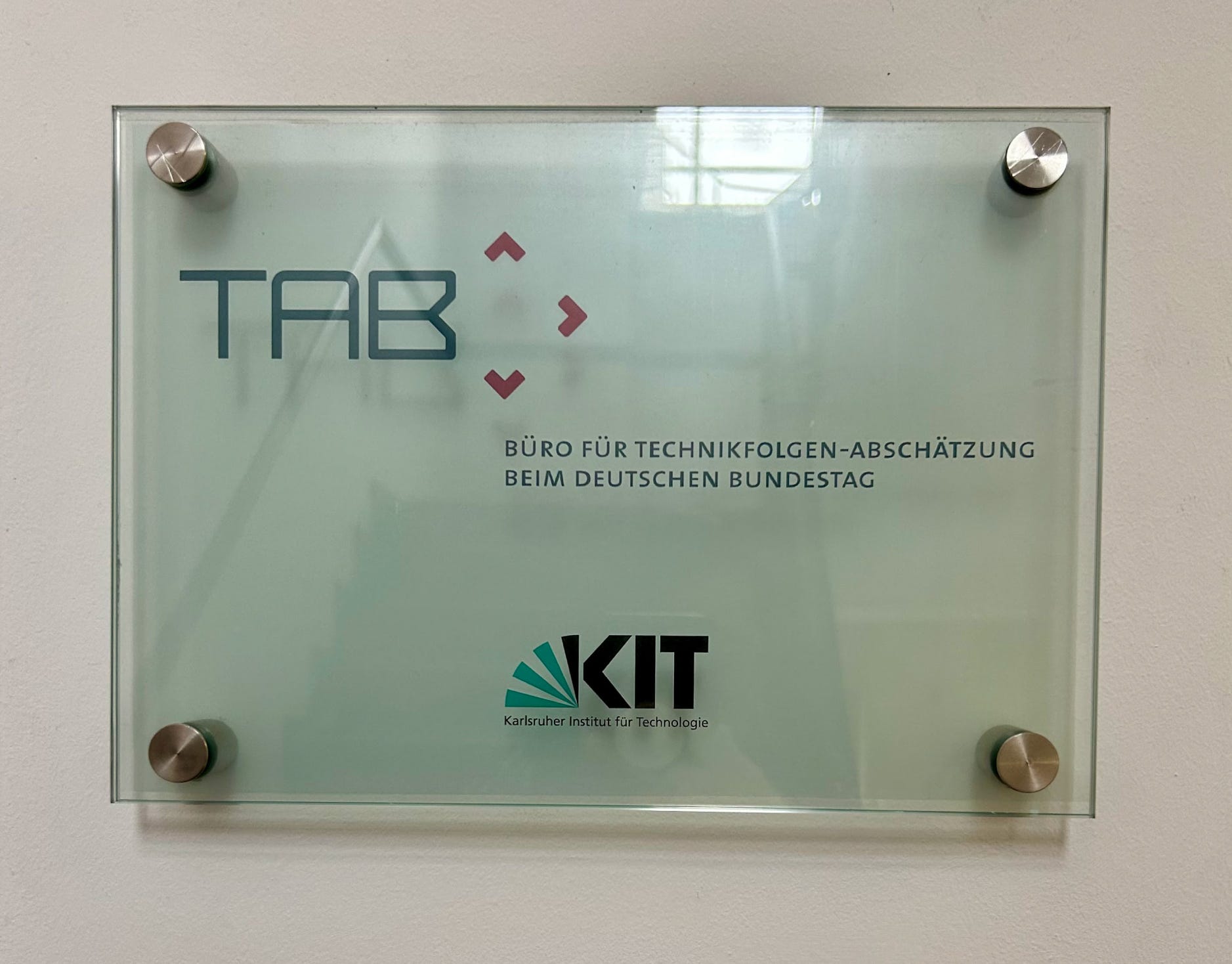A visit to the German Bundestag

A guest post by Beatriz Rey | April 2025
"I am keen to understand how TAB supports the parliament in its decision-making process and how its work informs legislative discussions. Given TAB’s crucial role in providing scientific expertise, I believe its approach would offer valuable insights for our international network of legislative professionals and researchers....", asked Beatriz Rey before her visiting us in Berlin at the end of March – one day after the newly elected Bundestag came together for the first time.
Beatriz Rey is a political scientist specializing in legislative politics. She is a Fellow at the University of Lisbon, the University of São Paulo, and the POPVOX Foundation. Her post was first published on April 9 in Modern Parliament (“ModParl”) , a newsletter from POPVOX Foundation that connects legislative modernizers worldwide and aims to explore how parliaments adapt to new challenges, especially in technology, transparency and institutional modernization.
We're glad to share her "outside perspective" on our work here.
"I picked the most hectic time to visit Berlin at the end of last month. As we noted in March, coalition negotiations for government formation were in full swing, and the Bundestag (the federal parliament) was buzzing with activity. Despite the rush, I managed to squeeze in a quick exterior tour of the Reichstag with Dr. Martin Kamprath, who works for the Bundestag’s Scientific Service (a conversation with him is coming soon). What struck me most was how the annex buildings — like the one where parliamentary committees meet — are made almost entirely of glass, allowing the public to literally see the work being done inside. The dome, too, is built from glass. Transparency here is part of the architecture.
While I was there, I met with Bernd Stegmann and Dr. Christoph Kehl, researchers at the Office of Technology Assessment (TAB) for the Bundestag. Founded in 1990 after more than a decade of deliberation, TAB was born from the Bundestag’s recognition that effective democratic decision-making requires impartial scientific advice. TAB is an independent research office formally contracted by the Bundestag, currently hosted by the Karlsruhe Institute of Technology (KIT), and staffed by a multidisciplinary team of researchers — philosophers, physicists, biologists, and more. TAB’s role is to serve the parliament — not the government — and to do so on the basis of political consensus. Every two to three years, the Bundestag’s research, education, and technology committee (the one responsible for oversight of TAB) solicits topic proposals from across parliamentary parties and committees. All project decisions must be made in consensus by a “rapporteur group” made up of representatives from every political faction.

It is a unique model. Researchers at TAB do not decide what to investigate — the parliament does. And yet, the office maintains a remarkable degree of scientific independence. Reports are neutral, focus on presenting policy options rather than recommendations, and are written in accessible language, with careful attention to translation from scientific expertise to policy relevance. Once finalized, reports are published both on TAB’s website and officially as Bundestagsdrucksachen — formal parliamentary papers that circulate through committees and, in some cases, are debated in the Bundestag plenary.
One of these reports has taken on a life of its own: TAB inspired a bestselling novel and then found itself back in the spotlight during a real-world crisis. Originally conceived as a sober, science-based assessment of vulnerabilities in modern societies, the 2011 “Blackout” study not only became the foundation for Marc Elsberg’s thriller Blackout – Tomorrow Will Be Too Late, but also gained renewed relevance a decade later during Europe’s energy crises. As download numbers soared once again in 2021 and 2022, it was clear: the questions raised in that report had not gone away — they had only become more urgent.
But like so many democratic institutions, TAB is operating in increasingly uncertain terrain. Changing political dynamics have TAB’s staff wondering how long the cross-party consensus that supports their work can hold. “If even one member of the rapporteur group refuses to engage or block decisions,” Kehl told me, “the entire process can stall.” The future of their model, in other words, depends on continued political will across all factions to uphold evidence-based policy advice and decision-making.
At the same time, TAB is being asked to do more — and to be more visible. There are growing expectations to engage more on social media, to publish not just 200-page technical reports but also crisp, digestible summaries. The challenge is real: how do you communicate complexity without distortion? How do you remain neutral in a media environment that rewards controversy? And how do you explain the value of scientific restraint — of not offering recommendations — when political debate thrives on strong, polarized positions?
And yet, despite these challenges, TAB continues to evolve. It has published some of the Bundestag’s most influential recent reports, including an early and widely read assessment of generative AI in early 2023 — written just weeks after the release of ChatGPT. Internally, TAB is now developing its own guidelines on how to use AI in its work, balancing potential efficiencies with the demands of neutrality, data quality, and scientific integrity. There is even quiet anxiety among some researchers: What happens when AI tools begin producing high-quality summaries and analysis faster than humans can? Could legislators be tempted to bypass slow, cautious, human-led assessments?
These are exactly the kinds of questions TAB exists to explore — and to ground in thoughtful, pluralistic inquiry. As one staff member put it: “Our job is to assess technology. And I don’t think it’s logically possible for technology to assess itself.” In an era of deepfakes, algorithmic misinformation, and shrinking attention spans, that insight feels more important than ever.
| This article reflects the opinion of the authors and not necessarily nor exclusively the opinion of TAB. For more information about the content of these articles and associated projects for the German Bundestag, please contact the authors or info∂tab-beim-bundestag.de. |
